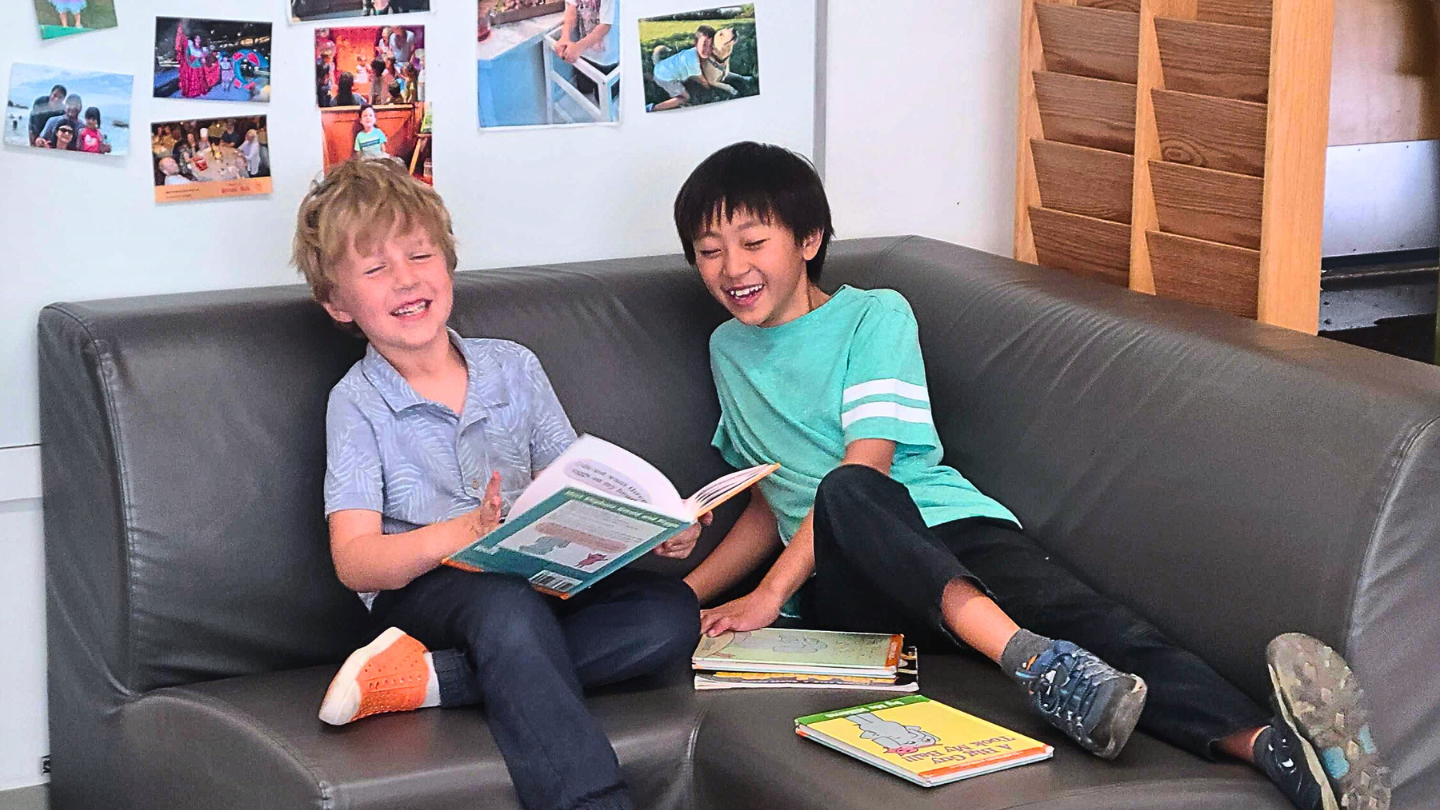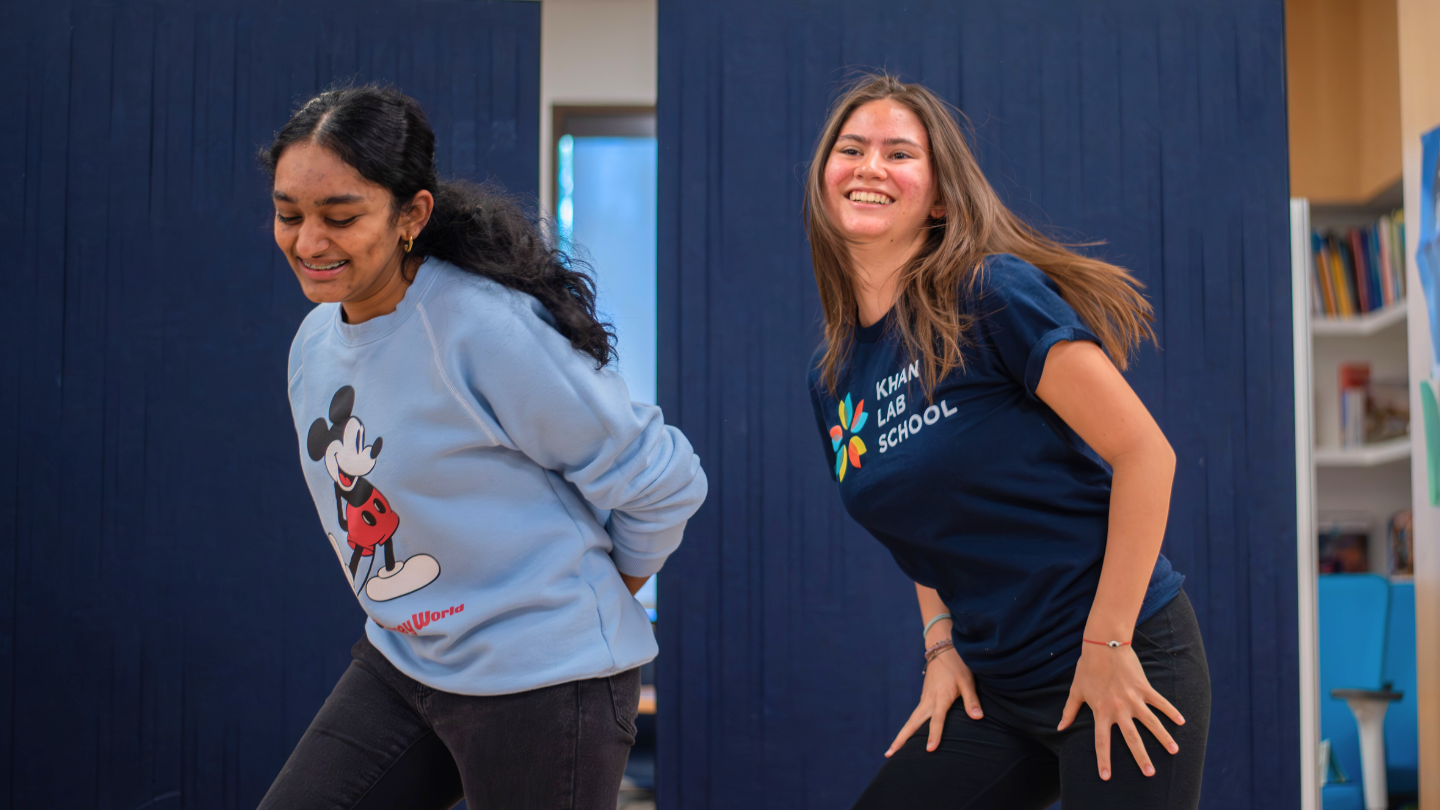Student Wellbeing
At Khan Lab School, we recognize that student wellbeing and academic growth go hand in hand. We believe students thrive when they feel truly known, supported, and empowered to take risks and explore their passions. Our approach evolves across divisions—from building foundations in Lower School to co-creating support systems in Upper School.
Lower School

Building Foundations for Wellbeing
- Advisory: In the Lower School, advisors serve as each student's primary advocate and family liaison. They lead Morning Meetings, guide social-emotional learning, and support students in setting goals. This consistent, caring presence fosters strong relationships, helping students build confidence, self-awareness, and ownership of their learning.
- Morning Meeting: Each day begins with a Morning Meeting, where students gather to greet one another, share experiences, and build community. This daily practice creates a predictable environment where every child feels seen and valued. Through structured activities, games, and discussions, students develop essential social skills, practice active listening, and learn to celebrate both individual and collective achievements.
- Social-Emotional Learning Throughout the Day: Social-emotional learning is woven into every part of the Lower School experience—classroom routines, collaborative projects, recess, and everyday interactions. Teachers guide students in recognizing and expressing emotions, developing empathy, resolving conflicts peacefully, and building strong relationships. Whether working in the Exploration Lab, navigating classroom challenges, or handling playground dynamics, students learn that their feelings matter and that they have tools to manage them constructively.
- Mindfulness & Self-Regulation: All students receive age-appropriate instruction in self-awareness and emotional regulation strategies. Through mindfulness practices, breathing exercises, and movement breaks, students learn skills to manage their emotions. These practices are integrated throughout the day, helping children recognize their needs and respond thoughtfully rather than reactively.
- Family Partnership: We believe children thrive when home and school work closely together. By maintaining open communication between teachers and families, we partner to support each child's growth and wellbeing. When we align around shared values and expectations, children gain confidence, learn consistent boundaries, and develop a strong sense of security and belonging.
Middle School

Fostering Academic Success and Personal Growth
- Advisory: Students receive personalized support in small, grade-level groups of 8-10. Each advisor serves as both student advocate and primary parent contact, fostering a trusting environment where students can discuss academic, social, and emotional concerns. This tailored approach strengthens relationships and ensures families stay connected to their child's education.
- Life Skills Lab: Life Skills Lab offers a comprehensive approach to personal character development, blending practical skills with social and emotional learning. The course integrates SEL principles to foster self-awareness, empathy, and resilience while incorporating Council tradition practices that emphasize group discussions and personal reflection. Students engage in hands-on activities to develop practical life skills such as financial literacy, time management, and effective communication. Specialized modules cover critical topics including digital media literacy, health education, and decision-making skills, providing students with the knowledge they need to navigate complex challenges.
- Goal Time: All middle schoolers receive at least two hours weekly to work at their own pace on projects, catch up on assignments, and complete coursework. This supervised, flexible time helps students manage their workload effectively while receiving targeted support for individual academic needs.
- Analog Hour: Students unplug from technology weekly to engage in screen-free, creative activities. Whether exploring projects in the Imagination Lab, reading, playing games, or practicing instruments, Analog Hour creates essential balance—fostering discovery, creativity, and deeper peer connections.
- Personal Expeditions: Through passion-led projects, students deeply explore areas of personal interest—from scientific investigations to artistic endeavors. With advisor guidance, they formulate research questions, manage timelines, document progress, and present findings to the community. These expeditions build essential skills in self-directed learning, critical thinking, and project management.
Upper School

Co-Designing Student Support Systems
- Advisory as Community: Upper School advisory serves as each student's home base—a consistent community where they're known deeply and supported fully. Advisors serve as advocates, mentors, and primary family contacts, ensuring no student falls through the cracks. This structure provides the safety net that allows students to take academic risks, explore their identities, and prepare for life beyond our walls.
- Student-Driven Advisory Design: Our advisory program is co-created with students each year. Through senior-led workshops and regular feedback sessions with advisors, students shape the topics, structure, and focus areas that matter most to them. This collaborative approach ensures that advisory remains relevant, engaging, and responsive to the evolving needs of our community.
-
Grade-Level Focus Areas: Working with student leaders, we've developed a developmental progression that addresses what students want to learn:
– 9th Grade: Executive function skills and academic habits for high school success– 10th Grade: Interpersonal skills, empathy development, and healthy relationships– 11th Grade: Real-world skills, from financial literacy to car maintenance– 12th Grade: Mentorship and leadership through teaching younger students
- Authentic Reflection & Growth: Rather than prescribed check-ins, Upper School advisory creates space for genuine reflection through varied formats: council circles for deep listening, service to the school community, and structured journaling for self-discovery. Students have agency in how they engage with their own growth, whether through community service projects, internship experiences, or creative expression.
